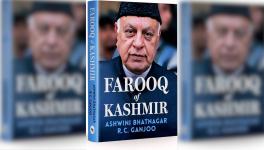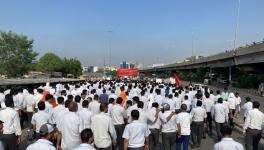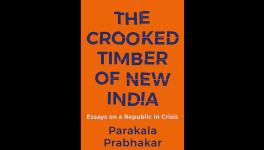Maruti Suzuki Workers Get to Tell Their Story at Last
In Japanese Management, Indian Resistance: The Struggles of Maruti Suzuki Workers (Speaking Tiger, 2023), journalist and activist Anjali Deshpande and human rights lawyer and writer Nandita Haksar narrate events that preceded and followed the violence that broke out at the Maruti Suzuki plant in Manesar, Haryana, in July 2012. Their book breaks new ground for it examines one of India’s so-called corporate success stories from the perspective of those who worked, or still work, in it. How India’s biggest car manufacturer treated its workers for years, undermining their dignity and safety for higher profits, and the workers’ continuing struggles against this, despite the disillusionment meted out to them by courts, police, political parties—the system as a whole—form a large part of the narrative.
The following is an excerpt from the book.
The avalanches come
We should help dig each other out.
-Hafiz, Persian Sufi poet, 1325-1390
The Maruti Suzuki workers, both those who are still working at Manesar and Gurgaon, and those who were dismissed, continue their struggle for justice despite the odds stacked against them. Theirs is a truly heroic struggle. The young men involved and their families have shown courage, uprightness and self-sacrifice in their fight for the right to work and live in dignity and to ensure a secure future for their children. It was remarkable to see the spirit of some of the union leaders that we interviewed when they came out of jail after ten years. Almost all of them took the opportunity to study at the Indira Gandhi National Open University and have successfully graduated in social sciences; some have even got post-graduation degrees. Five workers, who were not union leaders, demanded to learn Japanese in jail. One of the workers, who had an operation to remove a brain tumour, is now once again singing for a living by posting his compositions on YouTube.
The young men exercised regularly and one of them excelled in yoga while others joined modern dance classes in the jail. But these degrees or skills are of little use to them. They cannot get jobs. Some have taken to farming on small plots, others have taken out loans to start small businesses. As one worker said in his interview: ‘I am so happy to have such good friends. But I can’t depend on their munificence now. I must fend for myself.’
These workers, most of them young men between the age of twenty to thirty, joined the Maruti Suzuki factories after passing out of various ITIs. Their parents worked extremely hard, sacrificed comforts to ensure their boys (in this story, there are few girls and women) got a good education. The workers of Maruti Suzuki belonged to conservative families, rooted in a social milieu where hard work was a value to be cherished. They proudly wore the uniforms of the Japanese factory, even adjusted to the new concept of time and eagerly learnt new skills.
But then the workers saw how the management exploited them, how it cheated them of just and fair wages. To begin with, they made many workers work for depressed wages in the name of training them or hiring them as apprentices even when they were doing the same work as the permanent workers. Most permanent workers in Manesar had worked as contract workers and therefore felt a deep solidarity with them. The Maruti Suzuki Workers Union insisted on fighting for the rights of the contract workers, adding their issues to the union’s charter of demands. It was a heroic act which went against the advice and warnings of larger national trade unions.
When the union leaders were put in jail, the dismissed workers formed a provisional committee and continued to organize meetings, dharnas and marches to focus public attention on the injustice being done. The coordination committee collected money from workers and unions all over India, not from foreign-funded NGOs but from unions, to support the families of those sentenced to life imprisonment. They ensured that the families never felt isolated.
Now, the union in Manesar has decided to support the struggle of the dismissed workers. This has cemented the solidarity among the workers. The dismissed workers are fighting their cases in the labour court. They travel from their villages to Gurgaon to attend hearings, often to simply be given another date by the court. This charade has been masquerading for justice for the past ten years. One worker who won his case in Gurgaon lost it in the High Court.
One of the dismissed permanent workers, who is now a daily wage earner, says that on average there are three hearings in a year before the labour court. In addition, he must come to meet his lawyer too. Every visit to Gurgaon means losing three days’ wages. On top of that are the expenses: he spends Rs 500 on the bus fare and then there is the expenditure on food. His stay would be free, luckily, because the workers would accommodate him. Of course, much time was lost on the case with the courts remaining closed for three years during the COVID-19 pandemic. Time was also lost when a judge was transferred. And sometimes things get delayed simply because the lawyers are on leave.
Many of the workers’ families were stigmatized because their sons were in jail. People still strongly believe only criminals are convicted, not hard-working, honest workers.
The workers have knocked on the doors of every political party. The ruling party, the Bharatiya Janata Party, is committed to supporting foreign corporations at the cost of the Indian citizen. But the Congress party, which accuses the BJP of being a ‘suit-boot ki sarkar’, or a party of the rich, has itself shown utter indifference to the plight of these struggling workers.
Yadavendra Sharma, whose interview we have included in chapter nine of this book, told us that the workers had tried to contact Sonia Gandhi through contacts with Sheila Dikshit in June 2013. Sonia Gandhi told them that she could not help those in jail because they have done wrong; they have destroyed property worth crores of rupees. To Yadavendra and his friends, this was yet another example of the kind of political environment we live in.
In this book, we have not gone into the details of the criminal case or the proceedings before the labour courts, choosing instead to focus on what the workers told us themselves. But the proceedings show the extent of injustice done to the workers, how the bias against workers is built into the legal system and institutionalized by bench and bar. The media, too, with the honourable exceptions, has seen the entire trade union movement and the Maruti Suzuki workers’ struggles from the lens of the ruling class.
There is, thus, a need to go to the other side of appearance and understand and perceive the corporate world from the vantage point of the workers. At least, in a welfare state, the ruling class recognizes the need to protect workers from extreme exploitation. But now, the welfare state seems to be rapidly giving way to corporate rule.
Indo-Japanese relations have been growing stronger. In 2006, Indian Prime Minister Manmohan Singh’s visit to Japan culminated in the signing of the Joint Statement Towards Japan-India Strategic and Global Partnership, and in 2014, during Japanese Prime Minister Shinzo Abe’s visit to India, both countries agreed to update their partnership to a ‘Special Strategic and Global Partnership’. The question is: what impact will this growing friendship have on ordinary citizens who work in Japanese enterprises?
It is significant that Japanese trade union members gave a statement of solidarity with the Maruti Suzuki workers’ struggles. Perhaps the basis of this solidarity will grow stronger in the years to come. For the time being, the workers have understood that they must rely on their own strength and the power of their organization. When they could not go near their factory because there was a curfew order which prohibited gatherings outside the premises, the dismissed workers came together and sat on a dharna outside the district magistrate’s office. The provisional committee of the union provided a delicious pulao with soya bean nuggets and ghiya chane ki daal. The workers shared their meal with passersby!
Dr BR Ambedkar recognized that the purpose of constitutions has been to limit state power in order to preserve the freedom of the individual. Ambedkar argued that fundamental rights must ‘eliminate the possibility of the more powerful having the power to impose arbitrary restraints on the less powerful by withdrawing from the control he has over the economic life of the people’.
The purpose of labour laws was to mitigate the imbalance of power between capitalists and labour. They ought to aim to secure the ‘rights to life, liberty, and the pursuit of happiness’ in both the public and the private spheres. He said: ‘A labourer not only wants equality but he needs liberty also; it is really intolerable and detrimental where the system proposes equality but denies liberty. The constitution in which equilibrium, of the both is established....is the ideal constitution for the labourers.’
Today, Babasaheb Ambedkar’s name is being evoked in a distorted way, to destroy the edifice of the labour protection laws he built to protect the workers.
The trade union movement is now faced with the challenge of fighting ruthless corporate power with successive governments stripping workers of their rights by making the rights guaranteed to them under the Indian Constitution meaningless. Workers are being disenfranchised.
Anjali Deshpande is a freelance journalist and author. Nandita Haksar is a human rights lawyer, teacher and author.
Get the latest reports & analysis with people's perspective on Protests, movements & deep analytical videos, discussions of the current affairs in your Telegram app. Subscribe to NewsClick's Telegram channel & get Real-Time updates on stories, as they get published on our website.
























